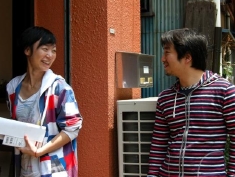Interviewed by Isao Tokuhashi & Hisa
Written by Isao Tokuhashi
Mail to: itokuhashi@myeyestokyo.com
Eriko Yamaguchi Part2
Bag designer/CEO

We are bringing you the interview with Eriko Yamaguchi, a young entrepreneur who manages her own bag brand called “Motherhouse”. In this part, we tell you about her present state and future vision.
*You can go to the first part from here!
*Eriko Yamaguchi (1981-)
Born in Saitama, Japan. She endured fierce bullying as a grade school girl. She started practicing judo in junior high school and then joined a “men’s” judo club in high school. She placed 7th in the national competition of judo.
Educated at Keio University to be a politician. She worked at the Inter-American Development Bank in Washington D.C. as an intern and she wanted to look at the current situation in developing countries.
She flew to Bangladesh and entered the master course of BRAC University as the first foreign student. Then she found jute and decided to make “cute” jute bags.
After her lone battle, she established the Motherhouse Co.Ltd. in March, 2006 and opened her own shop in Tokyo in August, 2007. Now she manages several shops and sells their bags at major department stores.
*Interview at Motherhouse Iriya Shop (Taito-ku, Tokyo)
*Edited by Daniel Penso
校正協力:ダニエル・ペンソ





“We will establish a world-class brand in the developing countries”.
Yamaguchi has gotten through many difficulties along the way so people think that she is courageous. she says that she is ordinary and sometimes she loses confidence because she is not a robot. She is willing to show the weaker parts of herself on her blog.
I’ve been keeping diaries since I was an elementary school girl and I started writing my blog when I went to Bangladesh. I wrote it to tell my family that I was safe. But at the same time, my customers also read it. Their comments really encouraged me. They said that my blog was reader-friendly because my writing sounded natural. And I couldn’t keep posting entries if I wrote in a formal style because I’m not a good writer.
I like to be spontaneous. “Be natural” is kind of my motto. I never wear business suits. I usually relax my shoulders but I work hard when it comes to a showdown.





“Circle Series”. Yamaguchi was inspired to design these bags after visiting areas devastated by the cyclone.
She always joins the factory workers and works together with them even if she is a CEO. She said on a TV documentary that she would like Motherhouse to be a big company and make it a big-name brand. But I worry a little bit whether or not she can stick to such a stance if it becomes a big one.
I delegate many tasks to staff and they can develop by themselves. So other people will design products, too. Also I entrust all operations management of our main office to Daisuke Yamazaki, the vice president of Motherhouse. Then everybody can develop themselves, I believe.

Daisuke Yamazaki, the vice president of Motherhouse (Right)
But if I become totally like a manager, is that going to be OK for a company? I would say no. As I said on a TV program, it’s really important for business judgement to go and see for oneself.
For example, when I went to Cambodia, nothing hit me. That kind of inspiration is really important like “I want to do something in this country!” for business activities. If something doesn’t well up from deep within the soul, I will collapse easily when I enter a difficult phase.
So I go and see things for myself and then make a decision when I consider expending to another country.
I see important points with my own eyes. That’s it.




Summer Color Jute 2008
Yamaguchi showed her faintheartedness on her blog a month before the opening day;
“I can’t do it anymore. I think like this over and over again every day. But I have no way out. If someone says so, I will tell him/her that he/she won’t die because of that trouble. If I die, any trouble will be gone. But realistically I have to find a solution. Even if I’m in desperate straits, I have to find a way narrowly and turn around to go to the next step. Oh, God! I never want to establish a company again.” (July 25, 2007)
I wonder if I really think like that. There are many, many things that I learned when I first started my own business and this made me feel happy about having started it. And there are many things that I was greatly excited by the business. Also I was surprised at my potential ability. I didn’t expect that I could get to this level. I used to plan to enter a company and work as an office worker. I didn’t know that I would be able to stand the ordeals and take a big step before.
But after I established my company and had staff, I learned that a person who found his/her dream would be able to exercise his/her abilities much more than ever. I experienced both more happy things and more hard things after starting this business. So my challenge enhanced my life.
But my first year was really tough. I did everything by myself like going to the production site, tons of paperwork for custom entries, making a company website and hitting the road… It was really hard then.
So I didn’t know how to train other staff members and also I wished many people who are totally the same as myself would be here. But it’s much more exciting for me to dash to the target with various kind of people.
Now I’m really enjoying life from deep down.


Every time she comes back to Japan, she interacts with her customers.
Yamaguchi’s future vision and idealized vision of Motherhouse.
We want to accept each other and enjoy diverseness. There are people with many kinds of backgrounds in my company. Also we have little experience in the retail field but we are operating a bag company. That’s why we have novel ideas and feel amused at them.
Now we are in the midst of a seriocomedy and it’s really substantial. Our shop marks its second year and a new workforce is joining us now. It’ll be the principal pillar to grow Motherhouse. I think it’s kind of silly but important for us to share experiences of collecting any mistakes, that are going to be useful for the organizational growth.
Every time I come back here, I see staffs whom I don’t know. One day I made a phone call here but a staff member who picked it up didn’t recognize me. Then I dread that my ideas won’t be received by newcomers. So I think the most important thing is info sharing.
I want it to be a company where everybody can exert his/her full potential both in Japan and Bangladesh.






A path which she and Motherhouse are following from now on.
I feel that people in Japan are depressed. In other Asian countries, people are poor but enjoying their lives. They have no lifeless eyes. On the other hand, I feel a lot of people have weary eyes when I wait at stoplights at crowded intersections here in Japan. I feel uneasy about it.
But as for Motherhouse, I feel that it’s becoming a decent organization every time I come here. We want to be an exciting company, like people see us feel excited about what we are doing next.
Actually I won’t be in Bangladesh for a long time, but I won’t be in Japan either. I want to go to other countries and expand our production base. I’m fit to do that.
There are many kinds of CEOs or presidents. Those who focus on a certain business, those who sow seeds in many fields, those who are really aggressive, those who organize their workers… As for me, I would like to be a president who puts a “pot” in a country and sows seeds in it.
So after our business in Bangladesh gets going, I will commit it to another person and go to another country. I want to do many things there but as a CEO, I wonder if it’s good for me and my company to reside in one country. I have to see things from a global perspective.
One of our staffs wants to go to Bangladesh. She will go over there in June 2007. She is a designer who used to design clothes, not bags. I interviewed some bag designers but I felt that they were lack of ideas. So I changed gears and met other kinds of designers.






(Bottom right) “This product is made from jute, cotton and cowhide.
This is made in Bangladesh”
Yamaguchi and Motherhouse’s mission is to offer the developing countries rays of hope. How does her perfect world look?
Low-priced products are produced in the developing countries and imported into the advanced countries now. I would like to change that trade structure. It shouldn’t be proportional to the economic force. For example, luxury items are produced in Bangladesh or Africa and exported worldwide. I would like to reverse the current. I don’t know how yet but if I could do that, I think the definition or scale of poverty and richness would change. Then people in the developing countries will change their mind in a favorable way.
My definition of “richness” is to be able to do what you want to do. There are many people who can’t give themselves up to things or who don’t find things that they want to do. If you give yourself up to something you want to do, you’ll be really happy.
 *Provided by Motherhouse Co., Ltd.
*Provided by Motherhouse Co., Ltd.
What is Motherhouse to you?
Now it’s integrated with myself. Yes, it’s myself.
So if I don’t mature as a person, Motherhouse can’t be significant for people.
If I am energetic, this company can be energetic, too. That’s why I don’t have any days off, none at all.
Motherhouse means everything to me now.
What is Bangladesh to you?
A place which develops myself. It’s like a school for me.
Every time I go there, I can develop myself, it tries me and I feel I’m braving difficulties. So I can hang tough.
What is Japan to you?
A country where I happened to be born in. And it’s only one of our markets.
I don’t stick to this country very much. A place for our business activities could be Europe or America. All of us say that we don’t need to be based in Japan.
We are sending in-house files to each other and those are written in English.
I don’t like to be limited in my thinking.
 *Photos by Mariko Kodaira, Isao Tokuhashi
*Photos by Mariko Kodaira, Isao Tokuhashi
Yamaguchi’s Links
Motherhouse (Japanese): http://www.mother-house.jp/
Motherhouse Taiwan (Traditional Chinese):
http://www.mother-house.tw/
Motherhouse Hong Kong (Traditional Chinese):
http://www.mother-house.hk/










1 Trackback / Pingback
Comments are closed.